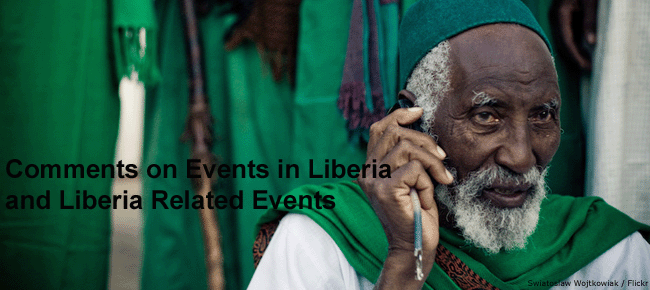Sunday, April 11
April 12, 1980 – 2010
I can’t help but think of April 12, 1980 when the anniversary of Samuel Doe’s bloody coup d’état approaches. I happened to be in Monrovia on that historic day, en route to Burkina Faso, then still called Upper Volta, where I was to witness three more coup d’états of which Thomas Sankara’s seizure of power was the most impressive.
1980 – 2010. Liberia underwent more changes in the past thirty years than in the century before. Doe’s People’s Redemption Council marked a U-turn in the history of Africa oldest Republic where the roots of the recent turmoil had been developing since 1822. In that year the first freed slaves and free-born blacks set foot here on West African soil. Despised and unwanted in the land where their forefathers had been brought under coercion, they established a Republic based on the model of the land where they had been born and had grown up. And like the slave masters had treated them, they treated the aboriginal population they met on what used to be called the Pepper Coast.
1980 – 2010. In these thirty years Liberia had one military dictator-president who was the country’s first President of tribal origin, six Interim Presidents among whom Africa’s first female Head of State, one elected warlord-president who was forced to step down, one Vice President who after becoming President had the shortest Administration in the country’s history - three months. He was succeeded by a ‘caretaker’-not called President who in his turn was succeeded by Africa’s first elected female Head of State. Compare that with the previous 130 years which had known only 23 presidents, 12 of them born in the USA or the Caribbean, 11 born in Liberia, among whom the country’s longest serving President, 27 years.
1980 – 2010. The people of Liberia suffered from two civil wars which cost over 200,000 people their lives. Many more suffered, were wounded, and remained traumatized after the wars had ended. In the early years of the third millennium, Africa’s oldest republic had gained the reputation of a ‘failed ‘state’, a conclusion which I personally do not share, for various reasons.
But undoubtedly true is that when Ellen Johnson Sirleaf took over, in 2006, the modern economy was in ruins, the foreign investors had left, like most of the political and intellectual elite, and the people were poorer and more divided as ever. The latest census revealed that the total population now numbers more than three million, not much for a country well endowed with natural resources, but too large in view of the actual National Budget of about US $ 350 million. Compare that with total public expenditures thirty years earlier, which amounted to US $ 324 million, in 1979, and it may be difficult not to despair looking at this budgetary standstill.
However, I do not share this feeling of hopelessness, I also disagree with the qualification ‘failed state’. Yet I am puzzled how it can be possible that people inflict upon other people the cruelties which we have seen in Liberia. Though Liberia is not the only country in the world where people underwent these sufferings. What to think of the United States of America where a major civil war raged between 1861 and 1865, divided the country, and costs half a million people their lives? By the way, isn’t it an ironic coincidence that the US civil war started on April 12?
Who would have qualified the USA in 1865, when the civil war ended, as a ‘failed state’? And what about Europe? There may be no other continent where so many wars raged, yet most European countries rank among the richest in the world nowadays. And look at Asia, take the example of Vietnam. This country was virtually destroyed by the Americans in the 1970s. Nowadays it is one of the emerging Asian economies, with Indonesia, India and China.
Liberia, once Africa’s leading iron ore exporter and the third largest iron ore exporter in the world, with many other precious minerals, with the largest mercantile fleet in the world and the world's largest rubber plantation within its borders, has the economic potential to recover from the wars and their aftermath. Liberia has many strong and intellectual people, the organization of the civil wars proofs it, as contradictory as this may sound. Both within and outside the national territory there are many hard working, capable and motivated people who in good combination with the nation’s natural wealth can turn the ‘Land of Liberty’, the previous ‘Pepper Coast’, into a small paradise where people harmoniously live together. The recipe? It is not as difficult as people tend to think. Good policies, in combination with investments in people, infrastructure and institutions have proven to be the road to take, leading to economic growth, development and prosperity.
Liberia can realize another U-turn, I am absolutely sure. The economic changes which the country underwent in the 1950 – 1980 period are proof of that – despite the ravages of the last 30 years. Government revenues rose from less than US $ 4 million (!) in 1950 to US $ 200 million in 1980. The National Product (GDP) was roughly some US $ 35 million in 1950, at the end of the 1970s it had grown to US $ 750 million. This was considered a phenomenal performance in those days despite the criticism and the conviction of many that Liberia could have done better had it managed better its economy and controlled more some foreign investors.
Liberia and Liberians should learn from the past if the next U-turn is to be realized. Yes, it can!
2010/04/11
Subscribe to:
Post Comments (Atom)


No comments:
Post a Comment